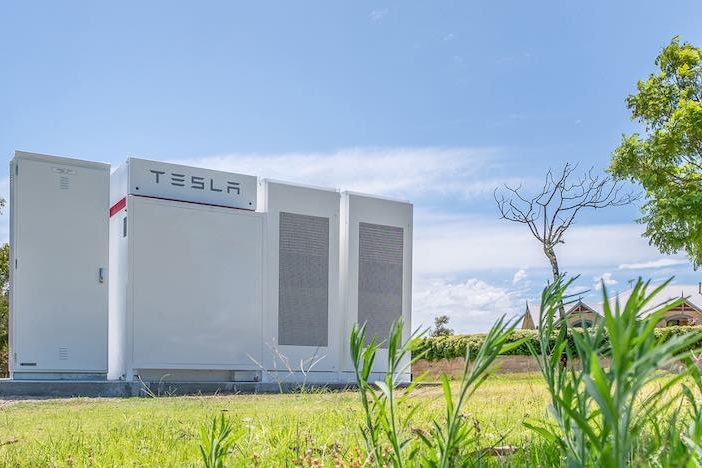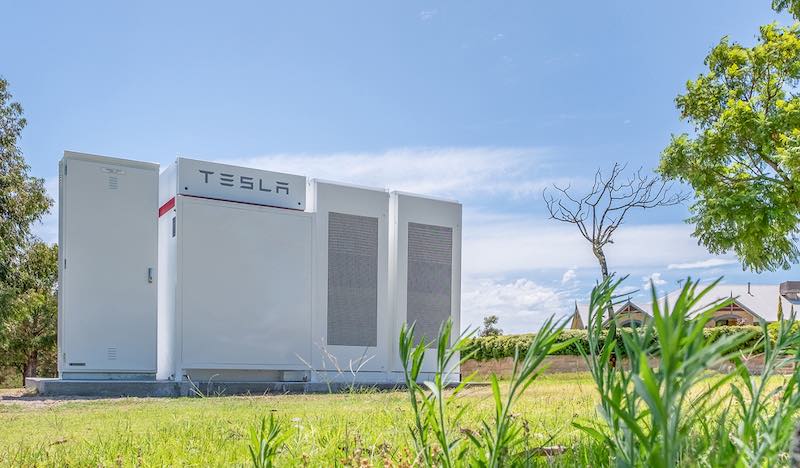
Western Australia has kicked off phase two of a ground-breaking trial that uses grid-connected Tesla batteries to provide “virtual” energy storage for households in areas of high rooftop solar uptake.
The PowerBank 2 trial, a joint effort of state government-owned network operator Western Power and retailer Synergy, has installed 116kW/464kWh Tesla battery systems on the grid in both the north-eastern Perth suburb of Ellenbrook and in Falcon, a southern suburb of Mandurah.
Solar households that participate in the 24-month trial can choose to access either 6kWh or 8kWh of virtual storage, at a cost of $1.60 or $1.90 per day respectively, to store the excess power from their PV systems.
This allows those homes to draw electricity back from the PowerBank during the afternoon and evening peak – when their solar systems stop generating – without having stump up thousands of dollars for their own behind-the-meter battery storage system.
The new battery installs follow up on an initial trial in late 2018 in Meadow Springs – another suburb of Mandurah which, as we have reported on One Step before, is one of Australia’s top solar postcodes, thanks to a huge uptake among the city’s households and small businesses.
Western Power and Synergy said this week that the Meadow Springs community battery had proven a great success, saving residents a collective $11,000 off their power bills and prompting the installation of a second battery in the neighbouring suburb of Falcon in November last year.
A further third grid-connected Tesla battery has now extended the offer to residents of Ellenbrook, in Perth – and there will be more to come.
Ellenbrook residents can trial battery storage technology as part of our PowerBank trial with @SynergyEnergy
Batteries allow storage of excess solar energy to use when it’s needed most – during the evening – long after the sun stops shining.
More: https://t.co/Hk5V9aG2H3 pic.twitter.com/agHpS4TO0k
— Western Power (@westernpowerwa) February 10, 2020
For Synergy and Western Power, the PowerBank trials have proven invaluable for their insight into the different ways battery storage technology can be used to benefit both consumers and the grid, particularly as more and more households switch to rooftop solar.
Not only does it allow access to solar storage for households that can’t afford to buy their own home battery – or have nowhere to install it – but it takes pressure off the grid during times of peak demand, by encouraging households to used their stored solar power.
“There is so much to learn about how to integrate battery storage technology into the sector, as we move away from the traditional centralised generation and network model, to a future that increasingly incorporates distributed energy resources, such as battery storage deployed at individual customer and community-scale levels,” said Synergy CEO Jason Waters.
“We know more of our customers want to know how they can benefit from battery storage technology in the future and want Synergy to partner with them directly to find solutions,” he said.
“There is a natural link to their requirements, as they are already effectively selling their excess solar PV electricity output to Synergy through the Renewable Energy Buyback Scheme and buy electricity from the grid when their solar panels are no longer generating.
“We know those customers are seeking an alternative to store and use that excess energy, to help them manage their household energy consumption more efficiently.”
Western Power acting CEO Dave Fyfe said the investment in grid-connected community batteries was delivering benefits beyond just solar energy storage.
“Community batteries don’t only provide immediate, cost-effective solar storage options, they also have a collective benefit of smoothing out power supply to all customers in the area and opening up the capacity for more solar to be installed in the future,” Fyfe said.
“We are in the process of identifying several locations that will deliver almost immediate benefit from the installation of a community battery and we are working to roll out batteries to these areas by the middle of this year.”
The power companies note that there are no lock-in contracts for homes that opt to take part in the trial. Customers are billed monthly and are offered seasonal updates on any savings they are making, and handy tips on how they can improve their energy use.

Sophie is editor of One Step Off The Grid and deputy editor of its sister site, Renew Economy. Sophie has been writing about clean energy for more than a decade.


